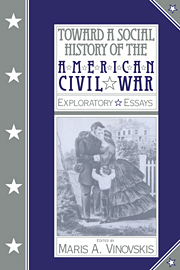Book contents
- Frontmatter
- Contents
- Introduction by Marts A. Vinovskis
- 1 Have Social Historians Lost the Civil War? Some Preliminary Demographic Speculations
- 2 Community and War: The Civil War Experience of Two New Hampshire Towns
- 3 The Northern Soldier and His Community
- 4 Voluntarism in Wartime: Philadelphia's Great Central Fair
- 5 The Civil War and Municipal Government in Chicago
- 6 Who Joined the Grand Army? Three Case Studies in the Construction of Union Veteranhood, 1866–1900
- 7 “Such Is the Price We Pay”: American Widows and the Civil War Pension System
- Index
2 - Community and War: The Civil War Experience of Two New Hampshire Towns
Published online by Cambridge University Press: 03 February 2010
- Frontmatter
- Contents
- Introduction by Marts A. Vinovskis
- 1 Have Social Historians Lost the Civil War? Some Preliminary Demographic Speculations
- 2 Community and War: The Civil War Experience of Two New Hampshire Towns
- 3 The Northern Soldier and His Community
- 4 Voluntarism in Wartime: Philadelphia's Great Central Fair
- 5 The Civil War and Municipal Government in Chicago
- 6 Who Joined the Grand Army? Three Case Studies in the Construction of Union Veteranhood, 1866–1900
- 7 “Such Is the Price We Pay”: American Widows and the Civil War Pension System
- Index
Summary
The Civil War was America's bloodiest war, leaving nearly as many dead as all our other wars combined. The significance of this conflict in the minds of Americans is reflected by the vast number of titles on the war, making the Civil War the most written-about subject in American history. The interest in the war is not surprising, because the conflict was, and is, seen as a fight for freedom and a test of whether the American system of government could succeed. Yet despite the importance of the conflict and the interest in it, little has been written about the impact that the war had on the lives of nineteenth-century Americans. Military aspects of the war have drawn the attention of many Civil War historians, but the lives of the common soldier and citizen have been virtually ignored.
My intention in the present chapter is to measure the effect of the Civil War on nineteenth-century America by analyzing the war experience of the soldiers and citizens of two New Hampshire towns: Claremont and Newport. The war's impact on these neighboring communities will be assessed by examining civilian life during and after the war. First I analyze the communities' reaction to the war as it unfolded for the citizens and soldiers of both towns. After showing that the war altered community life and changed attitudes toward warfare, I then examine the socioeconomic characteristics of individuals from Claremont and Newport who did and did not fight in the war, comparing and contrasting the socioeconomic backgrounds of participants and nonparticipants.
- Type
- Chapter
- Information
- Toward a Social History of the American Civil WarExploratory Essays, pp. 31 - 77Publisher: Cambridge University PressPrint publication year: 1990
- 6
- Cited by



